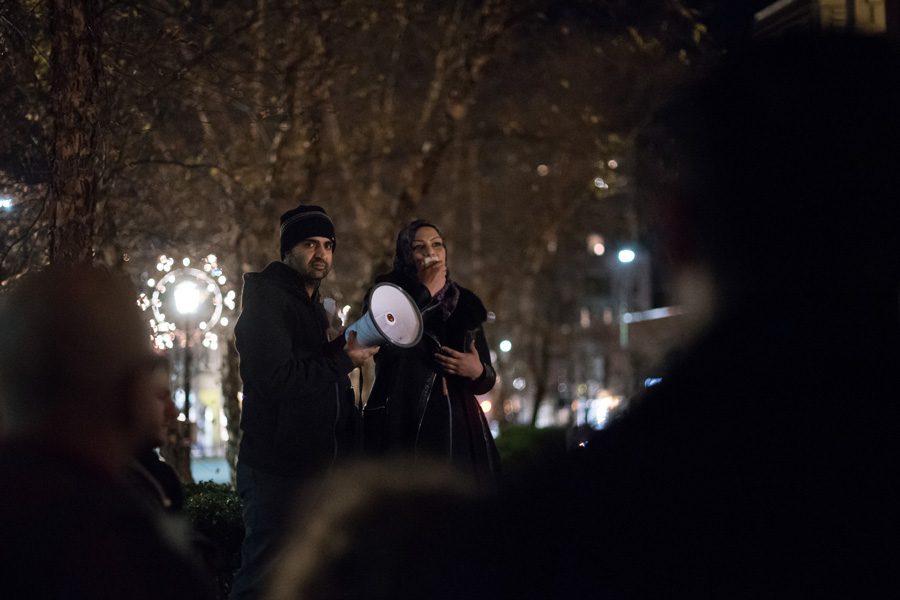Students, Evanston residents rally at Evanston Public Library in response to defacement of Islamic books
Lauren Duquette/Daily Senior Staffer
Northwestern associate chaplain Tahera Ahmad speaks in front of Evanston Public Library on Tuesday. Ahmad was one of several people who spoke at the rally, which was organized to denounce hate after several Islamic books were defaced at the library last week.
November 30, 2016
More than 30 Northwestern professors, students and Evanston residents rallied Tuesday evening outside Evanston Public Library to show solidarity after Islamic books were found defaced last week.
Seven books, including the Quran, were discovered defaced with Islamophobic, homophobic, anti-Semitic and racist language last week. The books were discovered before a joint program with EPL and NU’s Middle East and North African studies program.
EPL director Karen Danczak Lyons thanked those at the rally for their support. Danczak Lyons said the library was in the process of replacing the defaced books using community donations.
The library will continue to have programming to create safe spaces for discussion on multicultural issues, Danczak Lyons said.
“For those that think it’s okay to deface library property, I tell you that it is not, but I invite you to come to our programs and look in the eyes of our community,” she said. “It’s only through learning together and being together in a safe space can we strengthen our community and fight for change.”
Brian Edwards, director of the MENA program, said the defaced books hurt the Evanston community in particular but also had global implications.
“A local act of hatred becomes a global story,” he said. “This, unfortunately, has a devastating effect internationally … we’re the ones who look violent; we’re the ones who look hateful.”
In a statement sent out to MENA students and professors following the EPL incident, Edwards noted the national reach of the story, which he said may be due to hate crimes since the election of Donald Trump. The Southern Poverty Law Center compiled reports of 867 hate crimes that had occurred in the 10 days following the election.
Edwards said it is also significant that the defacement in the books targeted not just Muslims, but Jewish, LGBTQ and African-American communities as well.
“That groups who have often been placed in opposition to one another are lumped together by this vandal is part of the reason that the crime has affected us all,” he said in the statement. “Violence against any of us is violence against all of us.”
Behzad Raghian, who led the event on Tuesday, said it is important to work against people who “spew hate,” as incidents targeting marginalized communities — particularly Muslims — happen all the time. The campaign and victory of Donald Trump, Raghian said, allowed people to go public with racist and derogatory views.
“The election actually … created the foundation for hatred of this sort,” he said.
Raghian told the crowd that they should make efforts to find common ground with one another.
“Recognizing our humanity, that’s actually where we should be putting our efforts in tonight, and that’s actually where our focus should be,” he said.
Evanston mayoral candidate Steve Hagerty, whose business focuses on assisting those who have experienced emergencies, said strong relationships between people in a community helps it recover faster. Hagerty said diversity was just as important as unity.
“We can be a more inclusive community,” he said. “But we’re in a much better position than a lot of communities around this country to be a leader around social justice and civil rights.”
Northwestern associate chaplain Tahera Ahmad, who was called by EPL staff to help address the defaced books, said there was still a lot of work to be done to educate people. It is important for people to encourage love over hate, she said.
“My … fear is that hate is being normalized. We need to normalize love,” she said. “As a community, we have to stand together … we cannot let hate normalize itself.”
Email: [email protected]
Twitter: @noracshelly


